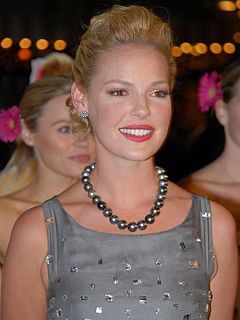A Quote by Lisa Kleypas
One of the servants had reported that Daisy had been sneaking around the house at night, deliberately tripping all the traps to keep the mice from being killed. “Is this true, daughter?” Thomas Bowman had rumbled, his gaze filled with ire as he stared at Daisy. “It could be,” she had allowed. “But there is another explanation.” “And what is that?” Bowman had asked sourly. Her tone turned congratulatory. “I think we are hosting the most intelligent mice in New York!
Related Quotes
"If it wasn’t for the mist we could see your home across the bay," said Gatsby. "You always have a green light that burns at the end of your dock." Daisy put her arm through his abruptly but he seemed absorbed in what he had just said. Possibly it had occurred to him that the colossal significance of that light had now vanished forever. Compared to the great distance that had separated him from Daisy it had seemed very near to him, almost touching her. It had seemed as close as a star to the moon. Now it was again a green light on a dock. His count of enchanted things had diminished by one.
She had been sharing a house with him for a week, and he had not once flirted with her. He had worked with her, asked her opinion, slapped her on the knuckles figuratively speaking when she was on the wrong track, and acknowledged that she was right when she corrected him. Dammit, he had treated her like a human being.
He lifted his gaze to the framed photograph of Tanya and him taken on their wedding day. God, she had been lovely. Her smile had come through her eyes straight from her heart. He had known unequivocally that she loved him. He believed to this day that she had died knowing that he loved her. How could she not know? He had dedicated his life to never letting her doubt it.
As she had been walking from the ward to that room, she had felt such pure hatred that now she had no more rancor left in her heart. She had finally allowed her negative feelings to surface, feelings that had been repressed for years in her soul. She had actually FELT them, and they were no longer necessary, they could leave.
Occasionally, on screen, Barbara [Stanwyck] had a wary, watchful quality about her that I've noticed in other people who had bad childhoods; they tend to keep an eye on life because they don't think it can be trusted. After her mother was killed by a streetcar, she had been raised in Brooklyn by her sisters, and from things she said, I believe she had been abused as a child. She had lived an entirely different life than mine, that's for sure, which is one reason I found her so fascinating. I think her early life was one reason she had such authenticity as an actress, and as a person.
He was so far from the gallant knights in her romantic fantasies ... He was tarnished, scarred, imperfect. Deliberately he had destroyed any illusions she might have had about him, exposing his mysterious past for the ugly horror that it was. His purpose had been to drive her away. But instead she felt closer to him, as if the truth had bonded them in a new intimacy.
She had witnessed the world's most beautiful things, and allowed herself to grow old and unlovely. She had felt the heat of a leviathan's roar, and the warmth within a cat's paw. She had conversed with the wind and had wiped soldier's tears. She had made people see, she'd seen herself in the sea. Butterflies had landed on her wrists, she had planted trees. She had loved, and let love go. So she smiled.
At that moment a very good thing was happening to her. Four good things had happened to her, in fact, since she came to Misselthwaite Manor. She had felt as if she had understood a robin and that he had understood her; she had run in the wind until her blood had grown warm; she had been healthily hungry for the first time in her life; and she had found out what it was to be sorry for someone.
Now very much against her will, she thought of the way Jace had looked at her then, the blaze of faith in his eyes, his belief in her. He had always thought she was strong. He had showed it in everything he did, in every look and every touch. Simon had faith in her too, yet when he'd held her, it had been as if she were something fragile, something made of delicate glass. But Jace had held her with all the strength he had, never wondering if she could take it--he'd known she was as strong has he was.
Resveratrol had a decent benefit when the mice were obese and sedentary. The mice that were fed a lean diet and resveratrol lived significantly longer than other treated mice as well as those that had no healthy diet and no resveratrol. So resveratrol is not an excuse to be lazy or eat whatever you want.
She couldn't believe what she did then. Before she could stop herself, she leaned up on tiptoes, put her arms around his neck, and kissed him on the mouth. Her lips brushed over his for the barest of seconds, but it was still a kiss, and when she came to her senses and dared to pull away and look at him, he had the most curious expression on his face. Brodick knew she regretted her sponatenity, but as he stared into her brilliant green eyes, he also knew, with a certainty that shook him to the core, that his life had just been irrevocably changed by this mere slip of a woman.
In the light of her son's comment she reconsidered the scene at the mosque, to see whose impression was correct. Yes it could be worked into quite an unpleasant scene. The doctor had begun by bullying her, had said Mrs Callendar was nice, and then - finding the ground safe - had changed; he had alternately whined over his grievances and patronized her, had run a dozen ways in a single sentence, had been unreliable, inquisitive, vain. Yes, it was all true, but how false as a summary of the man; the essential life of him had been slain.
































